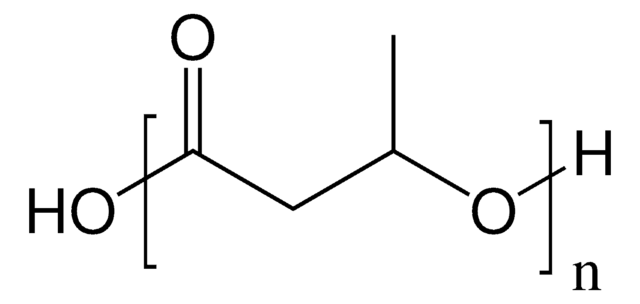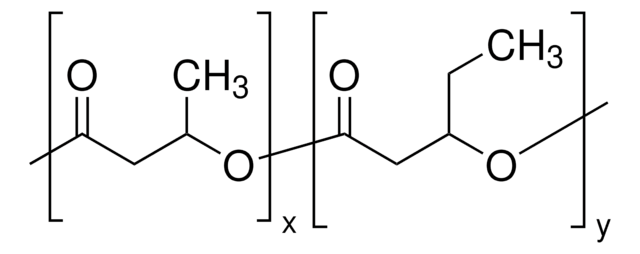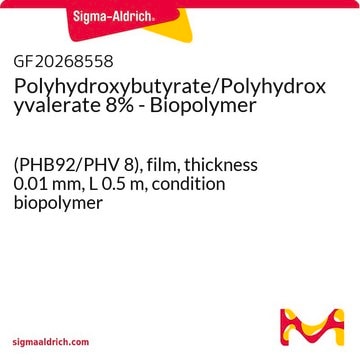Alle Fotos(1)
Wichtige Dokumente
363502
Poly-[(R)-3-hydroxybuttersäure]
natural origin
Synonym(e):
(R)-3-Hydroxybuttersäure, polymerisiert, PHB
Anmeldenzur Ansicht organisationsspezifischer und vertraglich vereinbarter Preise
Alle Fotos(1)
About This Item
Lineare Formel:
[COCH2CH(CH3)O]n
CAS-Nummer:
MDL-Nummer:
UNSPSC-Code:
12162002
PubChem Substanz-ID:
NACRES:
NA.23
Empfohlene Produkte
Qualitätsniveau
Übergangstemp.
Tm 172 °C (DSC)
SMILES String
CC(O)CC(O)=O
InChI
1S/C12H20O6/c1-8(14)6-11(15)18-10(3)7-12(16)17-9(2)4-5-13/h5,8-10,14H,4,6-7H2,1-3H3
InChIKey
QLACRIKFZRFWRU-UHFFFAOYSA-N
Suchen Sie nach ähnlichen Produkten? Aufrufen Leitfaden zum Produktvergleich
Verwandte Kategorien
Allgemeine Beschreibung
Biokompatibles, biologisch abbaubares Polymer.
Anwendung
Poly[(R)-3-hydroxybuttersäure (PHB) ist ein biologisch abbaubares und biokompatibles Polymer, das von verschiedenen Bakterienspezies erzeugt wird. Aufgrund ihrer geringen Resorbierbarkeit und abstimmbaren Eigenschaften kann sie in einer Reihe von Anwendungen eingesetzt werden, z. B. Gewebezüchtung, kontrollierte Freisetzungssysteme usw.
Lagerklassenschlüssel
11 - Combustible Solids
WGK
WGK 3
Flammpunkt (°F)
Not applicable
Flammpunkt (°C)
Not applicable
Hier finden Sie alle aktuellen Versionen:
Besitzen Sie dieses Produkt bereits?
In der Dokumentenbibliothek finden Sie die Dokumentation zu den Produkten, die Sie kürzlich erworben haben.
Molecular mass of poly [(R)-3-hydroxybutyric acid] produced in a recombinant Escherichia coli.
Kusaka S, et al.
Applied Microbiology and Biotechnology, 47(2), 140-143 (1997)
Proliferation and skeletal myotube formation capability of C2C12 and H9c2 cells on isotropic and anisotropic electrospun nanofibrous PHB scaffolds.
Ricotti L, et al.
Biomedical Materials (Bristol, England), 7(3), 035010-035010 (2012)
Engineering of Saccharomyces cerevisiae for the production of poly-3-d-hydroxybutyrate from xylose.
Sandstrom A G, et al.
AMB Express, 5(1), 14-14 (2015)
Rui-Yan Wang et al.
PloS one, 8(3), e57943-e57943 (2013-03-14)
A couple of DNA ligation-independent cloning (LIC) methods have been reported to meet various requirements in metabolic engineering and synthetic biology. The principle of LIC is the assembly of multiple overlapping DNA fragments by single-stranded (ss) DNA overlaps annealing. Here
Daniel Pfeiffer et al.
Journal of bacteriology, 194(21), 5909-5921 (2012-08-28)
Poly(3-hydroxybutyrate) (PHB) granules are covered by a surface layer consisting of mainly phasins and other PHB granule-associated proteins (PGAPs). Phasins are small amphiphilic proteins that determine the number and size of accumulated PHB granules. Five phasin proteins (PhaP1 to PhaP5)
Unser Team von Wissenschaftlern verfügt über Erfahrung in allen Forschungsbereichen einschließlich Life Science, Materialwissenschaften, chemischer Synthese, Chromatographie, Analytik und vielen mehr..
Setzen Sie sich mit dem technischen Dienst in Verbindung.








